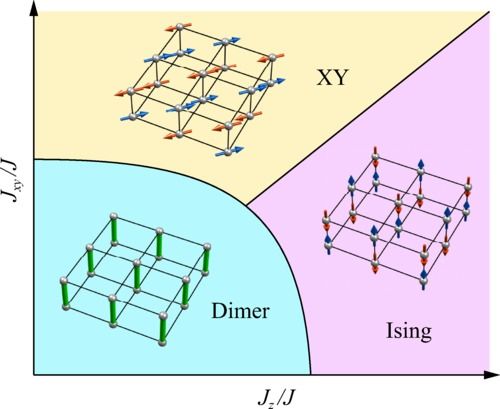Textron Systems has a new batch of Next Generation Squad Weapon prototypes, featuring improvements from soldier tests.





Circa 1994
It is generally accepted that structure formed in the matter dominated Universe, for obvious reasons. In this paper, we would like to suggest an alternate theory: that structure could have formed in the radiation dominated Universe if it was “protected” from destruction. This protection is envisioned as a “crystal”, of sorts, made up of primordial black holes (PBH’s), which form a cavitation into which any matter particles in the nucleosynthesis period of the Universe (around 100 seconds after the Big Bang) could have taken refuge. A sort of oasis in a sea of radiation. Such a scenario could solve several problems in cosmology, namely: how matter got a foot-hold over anti-matter in the Universe; the structure/galaxy formation problem; and possibly suggest ideas on the gamma-ray count and distribution.

The Higgs mode associated with the amplitude fluctuation of an order parameter can decay into other low-energy bosonic modes, which renders the Higgs mode usually unstable in condensed matter systems. Here, the authors propose a mechanism to stabilize the Higgs mode in anisotropic quantum magnets. They show that magnetic anisotropy gaps out the Goldstone magnon mode and stabilizes the Higgs mode near a quantum critical point. The results are supported by three independent approaches: a bond-operator method, field theory, and quantum Monte Carlo simulation with analytic continuation.

August was the second-highest month for sales ever.
Colorado has seen over $1.1 billion in marijuana sales since the COVID-19 pandemic began in this country, according to figures from the state Department of Revenue.
Legal marijuana sales topped $200 million in August for the second month in a row, reaching the second-highest monthly total since recreational sales started in 2014. Counting back to March of this year, when Colorado and the rest of the nation began shutting down over the pandemic, dispensaries have sold over $1.1 billion in marijuana products — and that’s not counting sales in September and October.
Dispensaries sold over $218.6 million worth of marijuana products in August, DOR data shows. Recreational sales accounted for more than $176.5 million (also the second-highest monthly total since 2014), while medical marijuana sales remained strong at just over $42 million.
This will be the 13th New Shepard mission and the 7th consecutive flight for this particular vehicle (a record), demonstrating its operational reusability. N…
Blue Origin successfully completed the 13th New Shepard mission on October 13, 2020. New Shepard flew 12 commercial payloads to space on this mission, including the Deorbit, Descent, and Landing Sensor Demonstration with NASA’s Space Technology Mission Directorate under a Tipping Point partnership. This was the first payload to fly mounted on the exterior of a New Shepard booster rather than inside the capsule, opening the door to a wide range of future high-altitude sensing, sampling, and exposure payloads.
Also on board were tens of thousands of postcards from students around the world from Blue Origin’s nonprofit, Club for the Future, some of which will include a special NASA Artemis stamp.
With this successful mission, New Shepard has flown more than 100 payloads to space across 10 sequential flights. All mission crew supporting this launch exercised strict social distancing and safety measures to mitigate COVID-19 risks to personnel, customers, and surrounding communities. Learn more about this mission and the payloads flown on New Shepard on BlueOrigin.com: https://bit.ly/367AcM3.

The combination of rooftop and utility scale solar met 100 per cent of demand in South Australia for the first time on Sunday, reaching a milestone that will surely be repeated many times over – and for longer periods – in the future.
The milestone was reached at 12.05pm grid time (Australian eastern standard time), with rooftop solar providing 992MW, or 76.3 per cent of state demand, and utility scale solar providing a further 315MW – meaning all three of the state’s big solar farms, Bungala 1m Bungala 2 and Tailem Bend were operating at full capacity.

Huanghe Hydropower Development has connected a 2.2 GW solar plant to the grid in the desert in China’s remote Qinghai province. The project is backed by 202.8 MW/MWh of storage.
Chinese state-owned utility Huanghe Hydropower Development has finished building the world’s largest solar power project in a desert in the northwestern Chinese province of Qinghai.
Chinese inverter manufacturer Sungrow, which supplied the inverters, said that the 2.2 GW solar plant was built in five phases. It involved an investment of RMB15.04 billion ($2.2 billion) and includes 202.8 MW/MWh of storage capacity. The company announced the storage system as a solar+storage project in mid-May, but at the time it did not reveal that it was to be connected to a giant solar plant.

I don’t know how long we’ll continue to have to wait.
Researchers at the Massachusetts Institute of Technology (MIT) are collaborating on a new “compact” fusion reactor that could feasibly be built and go online much faster than existing fusion reactor concepts. Does that mean fusion’s Lucy will finally let an industry Charlie Brown kick the football? Maybe.
☢️You love nuclear. So do we. Let’s nerd out over nuclear together.